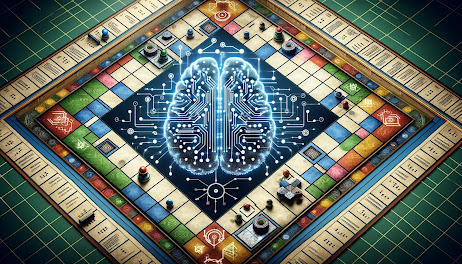The traditional board game of Ludo, a staple of childhood and family gatherings,
has been reborn in the digital age, thanks to advancements in artificial intelligence
(AI). This rebirth has introduced a new layer to the game's strategy and competition,
capturing the interest of both old enthusiasts and new players. The integration of AI
not only revitalizes the game but also opens a dialogue on the psychological
experiences of human players as they strategize against non-human opponents.
The Psychological Impact of Playing Against AI
Human vs. AI: A New Realm of Strategy
The encounter between human intellect and artificial intelligence in Ludo games
ushers players into uncharted psychological terrain. Players accustomed to
predicting human behavior must now navigate the often inscrutable decision-
making processes of AI. This shift demands a novel approach to strategy,
where players not only contemplate their moves but also endeavor to
understand the underlying algorithms of their AI opponents.
The Learning Curve: Adaptation and Improvement
Facing AI opponents in Ludo can be a humbling experience that steepens the
learning curve. Players find themselves adapting to the game's mechanics and
AI behaviors, a process that fosters personal growth and strategic improvement.
The challenge of outmaneuvering an AI teaches resilience and adaptability, skills
that transcend the digital board and find relevance in real-world problem-solving.
Emotional Dynamics: Frustration and Achievement
The rollercoaster of emotions experienced during a game against AI—from the
lows of frustration to the highs of achievement—adds depth to the psychological
impact of Ludo. The unpredictability of AI can provoke moments of exasperation,
yet overcoming these challenges offers a sense of accomplishment that is
profoundly gratifying. This emotional journey not only enhances the gaming
experience but also contributes to the development of patience and persistence.
The Role of AI in Enhancing Ludo Game Experience
Tailoring Challenges to Player Skill Levels
AI game development services are revolutionizing Ludo by creating adaptive
AI opponents capable of adjusting their difficulty based on the player's skill level.
This dynamic adjustment ensures that the game remains challenging yet accessible,
catering to both novices and seasoned strategists. Such tailored experiences
enrich the game, making every match a unique and engaging encounter.
Simulating Human-like Unpredictability
One of the hallmarks of AI integration into Ludo game development services is
the simulation of human-like unpredictability. AI can be programmed to exhibit
behaviors that mimic human spontaneity, making games less predictable and more
exciting. This unpredictability encourages players to remain alert and flexible in
their strategies, mirroring the complexity of human competition.
Encouraging Strategic Thinking and Planning
Playing against AI in Ludo games stimulates strategic thinking and meticulous
planning. Players must anticipate AI moves, plan several steps ahead, and adapt
strategies on the fly. This cognitive engagement not only enhances the gaming
experience but also sharpens problem-solving and decision-making skills,
showcasing the educational potential of AI-powered games.
The Future of Ludo Game Development Services with AI
Innovations in AI Game Development Services
The future of Ludo game development is brimming with potential, thanks to continuous
innovations in AI game development services. Emerging technologies in machine
learning and neural networks promise to create AI opponents that learn from each
game, offering increasingly sophisticated challenges that push the boundaries
of strategy and gameplay.
The Potential for Personalized Gaming Experiences
AI's ability to analyze player data and preferences heralds a new era of personalized
gaming experiences. Future Ludo games could offer customized challenges,
themes, and difficulty levels, creating a deeply personalized experience that
resonates with each player's unique tastes and abilities.
Ethical Considerations and Keeping the Human Touch
As AI becomes more integrated into Ludo games, ethical considerations about the
nature of competition and the preservation of the human element in gaming
emerge. Balancing technological advancements with the intrinsic social
and emotional aspects of Ludo will be crucial in maintaining the game's
charm and appeal.
Conclusion
The integration of AI into Ludo games is not just a testament to technological
progress but also a fascinating exploration of the human psyche. As players
navigate this new landscape, they encounter not only a formidable digital
opponent but also a mirror reflecting their strategic depth, emotional resilience,
and capacity for growth. The evolution of Ludo, fueled by advancements in
Ludo and AI game development services, promises a future where tradition
and technology converge to create enriching, engaging gaming experiences.
Read more blogs about the gaming industry:
The Impact of 5G on Online Educational Gaming
The Ethical Considerations of Using AI in Educational Games
The Role of Social Media in Promoting Online Educational Games

.jpg)

.jpg)
No comments:
Post a Comment